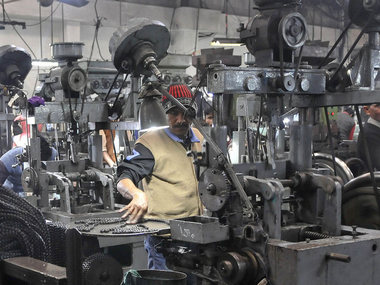New Delhi: There is a critical and immediate need for a significant stimulus of Rs 9 lakh crore to 10 lakh crore or four to five percent of the GDP to stimulate demand and supply for averting a long-term economic slowdown, the Federation of Indian Chambers of Commerce and Industry (FICCI) said on Monday. “If we do not help industries (large and small), we will have large-scale job losses which will contract demand significantly and will lead to further pressure on the utilisation of businesses and their liquidity,” FICCI President Sangita Reddy said in a letter to Finance Minister Nirmala Sitharaman. The situation will reduce government tax collections significantly and fiscal deficit will remain high (even without stimulus outflow) if the economic engine does not re-start, said Reddy. “The socio-economic impact of large-scale job losses and loss of demographic dividend will impact the future course of economic development even in medium-term,” she said. “We are staring at a significant contraction of demand and economy, and a cascading impact of long-term economic slowdown if the economic engine does not re-start immediately. Therefore, it is imperative for the government to immediately support the supply and demand side,” she said. [caption id=“attachment_8355911” align=“alignleft” width=“380”]  Representative image. Reuters[/caption] Reddy called for interest-free and collateral-free loans to MSME companies (turnover of less than Rs 500 crore) for up to 12 months period depending on the sector to enable them to cover fixed costs, salaries and other operational expenses. For non-GST paying companies, an alternate mechanism may be worked out (based on IT filing). Even if the government was to give Rs one lakh crore of loans to MSME businesses, the cost of interest payment will be Rs 8,000 crore (assuming 8 percent lending rate) which is 0.04 percent of the GDP. This loan can be given with pre-conditions that businesses will continue to run and there will be no layoffs of workers, she said. After one year, it can be converted into a grant if all conditions are met. Threshold tax collection could be one metric. “A COVID liquidity bridge may be created to support restructuring and additional loan requirement of large companies whose balance sheets have got impaired due to COVID. This will have a huge positive impact on the entire supply chain of these companies, including many small and mid-sized vendors, which otherwise may not survive the current crisis,” said Reddy. She said the problem being faced is largely that of liquidity and immediate release of moneys stuck in refunds and other government payments to the tune of Rs 2.5 lakh crore will immensely help the situation. This may have already been provided for in the budget. An additional sum of Rs 1 lakh crore over and above the PM Gareeb Kalyan Scheme must be earmarked and transferred to states to supplement their efforts to cater to the immediate needs of the poor and informal sector workers. Reddy said there is a need to accelerate infrastructure spend of Rs 1.7 lakh crore already allocated in the Budget to provide immediate impetus to the economy. A significant amount of this money can go towards low-cost housing and road construction. “Linkage of Pradhan Mantri Gram Sadak Yojana and low-cost housing construction with MNREGA workers will have a multiplier effect on the economy by putting money in the hands of people and energising 200-odd sectors related to construction. This will give significant impetus to growth.” Reddy said all recovery is dependent on consumption stimulus and survival of businesses itself. A special package is required for airlines, airport developers, hospitality and tourism, retail and healthcare sectors. For getting the industry back on track and moving, there needs to be a robust plan for phased opening up of the economy and re-starting growth. There is also a need to evaluate inter-twined supply chains to allow specific clusters or value chains to be opened, she said.
For getting the industry back on track and moving, there needs to be a robust plan for phased opening up of the economy and re-starting growth, FICCI said
Advertisement
End of Article


)

)
)
)
)
)
)
)
)



